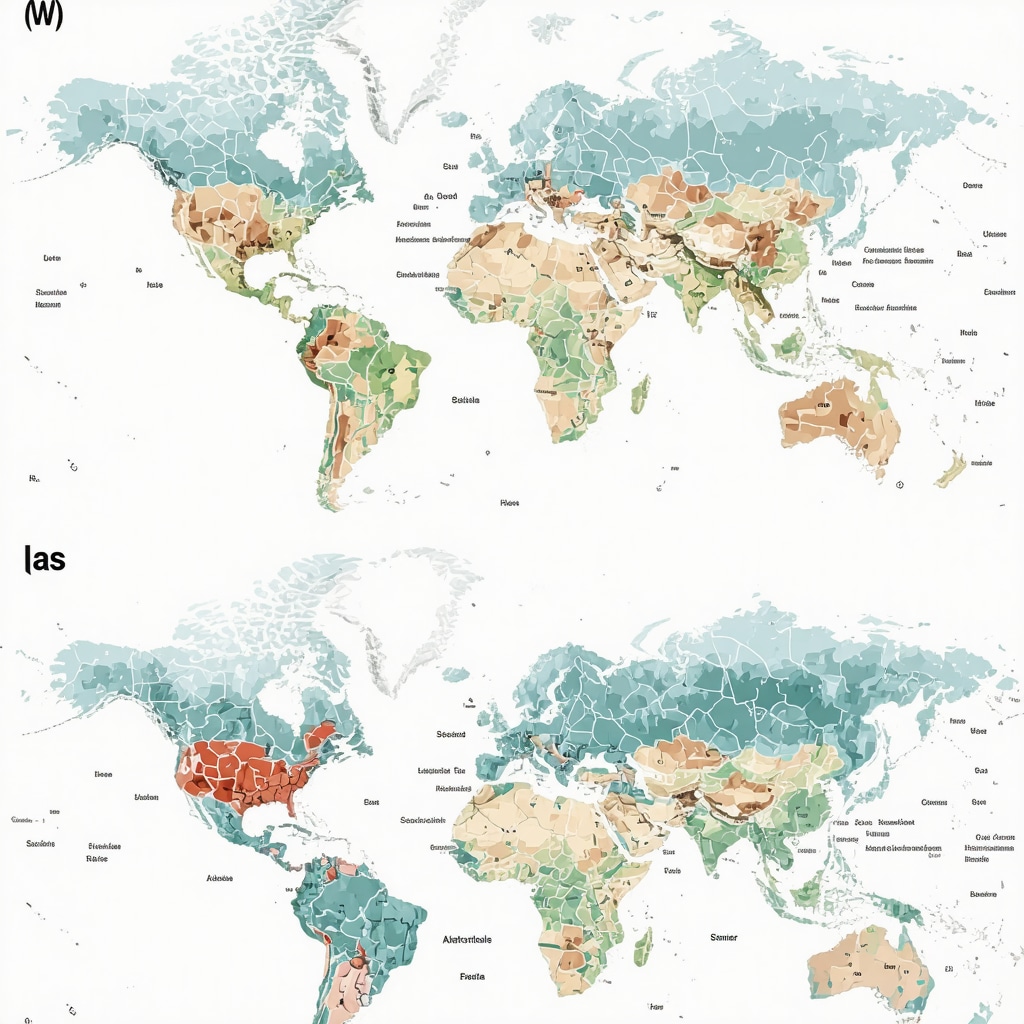Unlocking the Power of Google Keyword Planner: A Strategic Approach for GMB Optimization
In the competitive landscape of local search, **Google Keyword Planner** has evolved beyond a simple keyword research tool into a strategic asset that underpins effective **Google My Business (GMB)** optimization. As local SEO experts recognize, the nuanced selection of keywords through advanced analysis significantly influences visibility, click-through rates, and local engagement. This article explores how seasoned practitioners leverage Google Keyword Planner to craft data-driven, hyperlocal keyword strategies that outperform competitors and dominate local search results.
Why Keyword Precision Matters in GMB and Local Search Ecosystems
Unlike broad SEO, local search ranking hinges on meticulous keyword alignment with user intent within a geographical context. The challenge lies in identifying not only high-volume search terms but also hyperlocal variations that capture the nuances of community-specific queries. Here, Google Keyword Planner’s ability to generate keyword ideas rooted in real user data becomes invaluable, offering insights into search volume, competition, and seasonal trends that inform a sophisticated keyword taxonomy tailored to your service area.
Decoding Local Search Intent with Semantic Keyword Mapping
Effective local SEO transcends mere keyword stuffing; it demands an understanding of the semantic relationships between search queries and user needs. This is where advanced keyword mapping, supported by insights from tools like Google Keyword Planner, becomes essential. For instance, integrating LSIs such as “emergency plumber near me,” “affordable landscaping services,” or “best sushi in Downtown” into your GMB profile enhances relevance and authority. This process involves analyzing search intent patterns and aligning your GMB content, services, and reviews with these intent signals.
How can local businesses leverage Google Keyword Planner to identify niche-specific keywords that competitors overlook?
By exploring the ‘Discover new keywords’ feature within Google Keyword Planner, businesses can uncover long-tail, hyperlocal keywords with manageable competition. Combining this with insights from local search volume trends enables precise targeting. For example, a boutique bakery can identify keywords like “gluten-free cupcakes in Brooklyn” or “artisan bread shop near Central Park,” which are often neglected by broader competitors but highly effective for local prominence.
Furthermore, integrating external authoritative sources such as Moz’s Local SEO Guide or Google’s own Webmaster Blog can refine keyword strategies and optimize GMB profiles for maximum impact. Consistent monitoring and adaptation are crucial, as local search trends are dynamic and seasonal.
To deepen your mastery, consider exploring our comprehensive guide on Google Business SEO and how keyword research integrates into broader local SEO tactics.
Interested in elevating your local search game? Engage with industry experts or contribute your insights on keyword strategy best practices by visiting our Contact Page.
Unlocking Hyperlocal Keywords with Google Keyword Planner: Strategies for Competitive Edge
While many local businesses rely on basic keyword research, advanced practitioners understand the importance of deep-diving into niche-specific and long-tail keywords to outrank competitors. Google Keyword Planner’s ‘Discover new keywords’ feature allows you to analyze specific community-centric search terms that are often overlooked, such as neighborhood-specific phrases or emerging local trends. Leveraging these insights enables you to craft highly targeted GMB profiles that resonate with your audience’s exact needs, leading to higher engagement and conversions.
How Can Data-Driven Keyword Segmentation Transform Your Local GMB Strategy?
Segmenting keywords based on user intent—whether informational, transactional, or navigational—provides a nuanced approach to local SEO. For instance, a pest control service might target keywords like “exterminator near me” (navigational) and “how to get rid of termites in Brooklyn” (informational). Using Google Keyword Planner’s filtering and grouping capabilities, businesses can develop tailored content and review strategies that match these intent signals, ultimately boosting relevance and local rankings. For detailed tactics, explore our comprehensive local SEO optimization techniques.
What are the best practices for integrating hyperlocal keywords into GMB posts, reviews, and service descriptions to maximize visibility?
Integrating hyperlocal keywords seamlessly into your GMB content—such as posts, reviews, and service descriptions—can significantly enhance local pack visibility. Use natural language that incorporates neighborhood names, landmarks, or community-specific phrases. Consistent keyword use in reviews, especially when encouraging satisfied customers to mention specific locations or services, can boost your profile’s relevance. Additionally, leveraging tools like BrightLocal can help monitor keyword performance and review sentiment, ensuring your strategy remains aligned with evolving local search patterns. For more insights, visit our guide on maximizing Google Maps visibility.
External authoritative sources such as Moz highlight the importance of local keyword relevance and citation consistency in maintaining top rankings in local search results (Moz’s Local SEO Guide). Incorporating these best practices into your GMB optimization ensures a holistic approach to dominating your local niche.
To continue building your expertise, consider exploring our GMB SEO audit service to identify areas for strategic keyword and content enhancement. And don’t forget—sharing your success stories or challenges in local keyword implementation can inspire others and foster a community of practice around local SEO excellence.
Harnessing Semantic Keyword Clusters for Local Search Mastery
To excel in local SEO, it is imperative to move beyond individual keywords and embrace semantic clustering. This approach involves grouping related keywords based on search intent, geographical relevance, and user behavior patterns. Google Keyword Planner’s ability to generate extensive keyword ideas facilitates the creation of comprehensive semantic maps, which can significantly enhance GMB profile relevance and authority.
By meticulously analyzing clusters such as “eco-friendly pest control Brooklyn,” “organic landscaping Staten Island,” or “family-friendly sushi Manhattan,” businesses can tailor their content and reviews to mirror the nuanced queries of their local audience. This strategic alignment not only improves ranking potential but also fosters trust and engagement among community members.
The Role of Seasonal and Event-Based Keyword Insights in Local Optimization
Seasonality and local events heavily influence search behavior, especially in hyperlocal contexts. Google Keyword Planner’s trend analysis feature reveals peaks and troughs in search volume tied to holidays, festivals, or regional happenings. For instance, a lawn care service might see surges in demand during spring and early summer, while a holiday decoration retailer experiences spikes around December.
Integrating these insights into GMB content—such as posts highlighting seasonal promotions or event-specific services—can dramatically boost visibility during critical periods. Additionally, maintaining a dynamic keyword strategy that adapts to these temporal trends ensures sustained relevance and competitiveness in local search results.
Addressing the Nuances of Multi-Location Keyword Optimization in GMB
For businesses operating across multiple locations, optimizing Google My Business profiles requires a nuanced approach to keyword differentiation. Each location may attract distinct search queries based on local demographics, landmarks, and community interests. Google Keyword Planner aids in identifying location-specific long-tail keywords, such as “pet grooming near Central Park” versus “pet grooming in Queens,” enabling tailored profile content.
Implementing consistent yet location-specific keyword variations across GMB listings ensures that each profile resonates with its target audience. This localization not only enhances search relevance but also mitigates internal competition among listings, fostering a more robust local presence.

Illustrate a comparative visualization of keyword clusters across multiple localities, highlighting differences in search intent and volume for strategic optimization.
Advanced Competitor Keyword Analysis Using Google Keyword Planner
Understanding your competitors’ keyword landscape is vital for crafting an edge in local search. Google Keyword Planner’s ‘Get insights’ feature allows for the analysis of high-performing keywords in competitor GMB profiles or websites. By reverse-engineering top-ranking profiles, businesses can uncover hidden opportunities, such as niche keywords or underserved query segments.
For example, a local bakery might discover that competitors are not targeting specific dietary preferences like “gluten-free cupcakes in Brooklyn,” presenting an opportunity to fill this gap. Incorporating these high-potential keywords into your GMB strategy can lead to a decisive competitive advantage.
What are the most effective methods for integrating competitor keyword insights into your local GMB content without risking keyword cannibalization?
To maximize benefits while avoiding internal competition, prioritize creating unique content that emphasizes your distinct value propositions alongside targeted keywords. Use diverse keyword variations and focus on long-tail phrases that your competitors overlook. Regularly monitor your keyword performance and adjust your strategy accordingly, ensuring your GMB profile remains both relevant and authoritative.
External sources like Moz’s Local Search Ranking Factors emphasize the importance of citation consistency and keyword relevance in local SEO success (Moz’s Local SEO Guide). Integrating these principles with advanced keyword insights ensures a holistic approach to dominating local search landscapes.
Deepening your expertise through continuous learning and strategic refinement is key. Consider partnering with local SEO consultants or utilizing advanced tools like BrightLocal to monitor keyword performance and review sentiment, ensuring your profile remains optimized and competitive in an ever-evolving local search ecosystem.
Mastering the Art of Semantic Keyword Clustering for Local SEO Dominance
In the evolving landscape of local search, understanding and implementing semantic keyword clustering is crucial for achieving top-tier Google My Business (GMB) visibility. By categorizing related keywords into meaningful clusters based on search intent, geographical relevance, and community-specific nuances, businesses can create a cohesive and authoritative online presence that resonates with targeted local audiences. This sophisticated approach ensures that GMB profiles not only rank higher but also attract more engaged and relevant customers.
How can businesses leverage semantic keyword clusters to enhance their GMB profiles and outpace competitors?
Implementing semantic clusters begins with comprehensive keyword research using advanced tools like Google Keyword Planner, SEMrush, or Ahrefs. These tools facilitate the identification of related terms and long-tail variations that mirror user queries. For example, a fitness center in Chicago might cluster keywords such as “fitness classes downtown Chicago,” “personal training near Millennium Park,” and “yoga studios in River North.” Integrating these clusters into GMB descriptions, service listings, and posts creates a rich semantic footprint that improves relevance and ranking signals.
Furthermore, aligning these clusters with community-specific landmarks, events, and colloquialisms enhances local trust and authority. Regularly updating GMB content—such as posts highlighting local events or seasonal offers—embedded with these semantic clusters reinforces topical authority. External sources like Moz’s Local Search Ranking Factors underscore the importance of contextually relevant keywords and structured data, emphasizing that semantic clustering boosts both visibility and user engagement.
To achieve sustained success, businesses should employ tools like BrightLocal or Whitespark to monitor how well their semantic clusters perform over time and adjust strategies accordingly. Embrace this layered complexity to position your GMB profile as a definitive local authority, thereby attracting quality leads and fostering community loyalty.
Expert Insights & Advanced Considerations
Harness Hyperlocal Data for Competitive Advantage
Leveraging hyperlocal search data through Google Keyword Planner enables businesses to identify niche keywords that are often overlooked, leading to a significant edge in local SEO.
Semantic Clustering for Relevance
Advanced practitioners utilize semantic keyword clusters to enhance GMB profile relevance, which improves rankings and attracts highly targeted local traffic.
Seasonal Trend Integration
Integrating seasonal and event-based keyword insights ensures your GMB content remains timely, boosting visibility during peak local demand periods.
Multi-Location Optimization Nuances
Optimizing for multiple locations demands a granular, location-specific keyword strategy supported by Google Keyword Planner’s insights, preventing internal competition and maximizing local relevance.
Competitor Keyword Analysis
Deep competitor analysis using Google Keyword Planner reveals underserved niches and long-tail keywords, providing opportunities to outperform rivals in local search results.
Curated Expert Resources
- Moz Local SEO Guide: Offers comprehensive insights into local relevance and citation strategies critical for integrating keywords effectively.
- Google Webmaster Blog: Provides updates on algorithm changes and keyword trends affecting local SEO.
- BrightLocal Tools: Essential for monitoring keyword performance, review sentiment, and local rankings over time.
- SEMrush & Ahrefs: Advanced tools for semantic clustering and competitor analysis, complementing Google Keyword Planner data.
Final Expert Perspective
Mastering Google Keyword Planner for GMB optimization demands a sophisticated approach that combines hyperlocal insights, semantic clustering, and seasonal trend analysis. This strategic depth transforms basic keyword research into a powerful tool for dominating local search. As local SEO continues to evolve, integrating these expert techniques will ensure your business remains a prominent and trusted community presence. For those committed to excellence, partnering with local SEO specialists or leveraging advanced tools like BrightLocal can further accelerate success. Engage with these insights, refine your strategies, and lead your local market with authority and precision.



